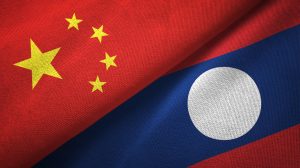Hundreds of soldiers from the Chinese army participated in wargames in Southeast Asia during the first two weeks of July.
The People’s Liberation Army (PLA) conducted joint exercises with the Lao People’s Army from July 5 to 18. The drills, known as Friendship Shield 2024, involved around 900 Laotian and 300 Chinese military personnel.
Pictures posted online show that Chinese soldiers were transported into Laos on a recently constructed railway, financed by Beijing’s Belt and Road Initiative (BRI) loans. The railway was also used to bring military hardware into Laos.
The PLA issued a press release explaining that the exercises involved live-fire shooting with various weapons, including heavy machine guns, sniper rifles, and grenade launchers. Photos show Laotian soldiers being trained in the use of Chinese weapons, including the new QBZ-191 assault rifle.
The PLA also said that its engineers operated drones in Laos, with an unnamed Chinese military expert telling the state-owned Global Times that “China is ramping up exploration and application of drones and robots, as well as their counters.”
Lt. Col. Santi Chanthalangsone, the head of Laos’ military training, welcomed the visitors. He said that “the Chinese may possess weaponry and expertise that could be beneficial to us. This exercise will fortify our military bonds and aid in the structuring and modernization of our armed forces.”
The joint exercises between China and Laos followed a similar operation involving the PLA and the military in Cambodia. Such events serve as a reminder of China’s intention to coordinate with armies in the Southeast Asian region. The PLA uses the drills to train troops in the use of a range of weapons in a variety of terrains.
Although a small nation, Laos – a one-party state run by the Lao People’s Revolutionary Party (LPRP) – holds a strategic position along the Mekong River, a crucial trade link between Southeast Asia and China. Laos also has a long history of being caught up in conflict. During the Vietnam war, it became the most bombed nation in history. More than a tonne of ordnance fell for every person living there at the time.
Resentment against the United States, as well as a long-established communist government under the LPRP, has strongly influenced relations between Laos and other countries. It is friendly with Vietnam and Cambodia. A North Korean delegation led by a senior official visited Laos in March 2024. Kim Jong Un sent what was described as a “verbal letter” calling for “comradely and strategic cooperation” with Laos to “hasten the victory of the socialist cause.”
Despite a rise in tourism and improved transport links with China, Laos remains the least developed country in Asia. The World Bank has noted that Laos’ perilous financial situation has left it increasingly dependent on China. In 2020, Laos ceded majority control of its electric grid to a Chinese company – a move it was obliged to make in order to avoid defaulting on a loan it had accepted from China.
That deal has sometimes been cited as an example of “debt trap diplomacy.” However, David Hutt argued in the Diplomat that the Laotian government must take responsibility for its action and the consequences.
Chinese President Xi Jinping met Lao President Thongloun Sisoulith in Beijing in 2023. Like Xi, Thongloun is both president and the general secretary of his country’s ruling party. At the meeting, the two leaders agreed to follow a five-year action plan to enhance relations.
Xi said that the China-Laos Railway, built by a Chinese company with Chinese money, should become a template for Belt and Road cooperation in the region. At the time, the railway was hailed as a boost for trade and an opportunity to facilitate more people-to-people exchanges. It has now also taken up an important role in China’s military strategy in the region.

































